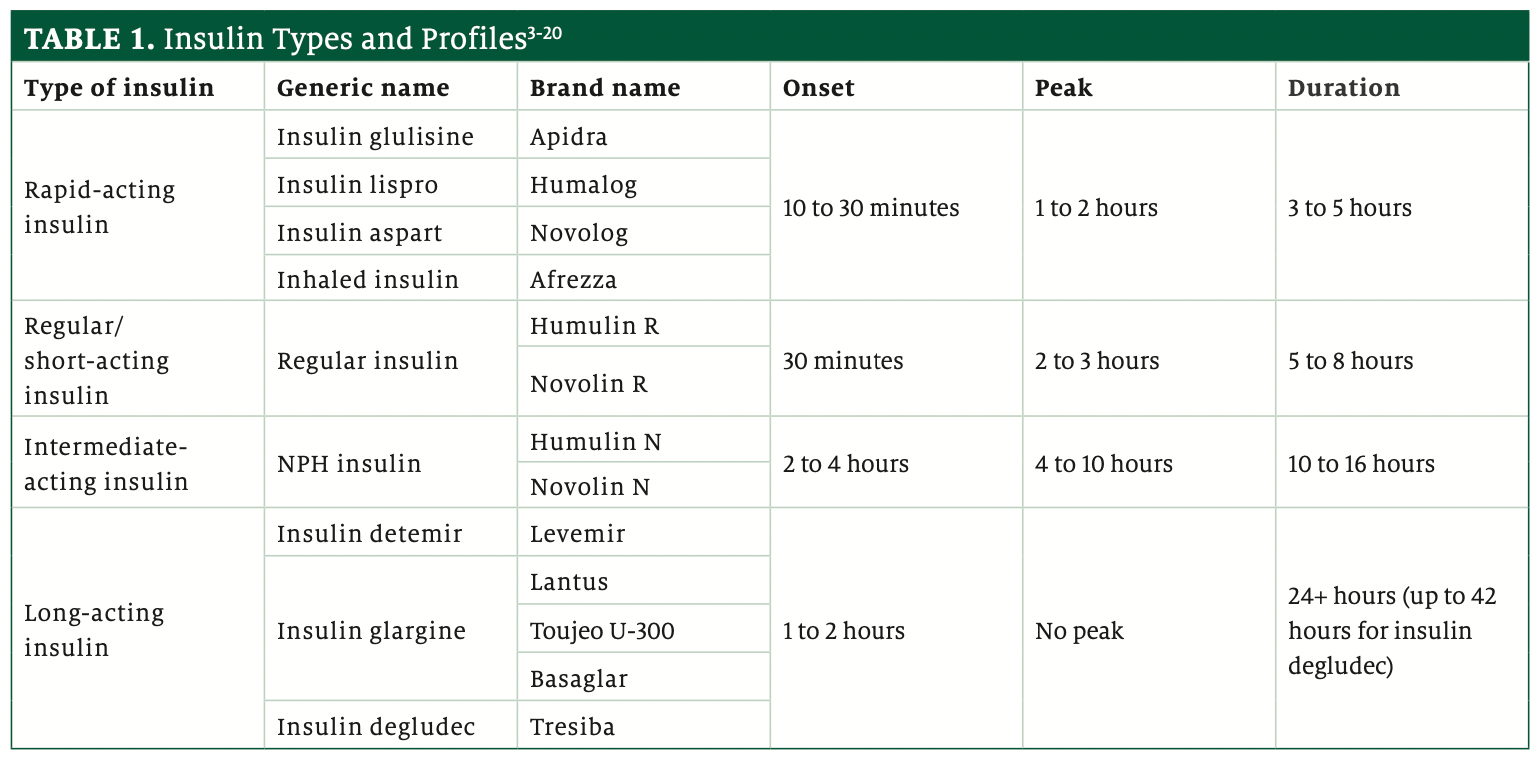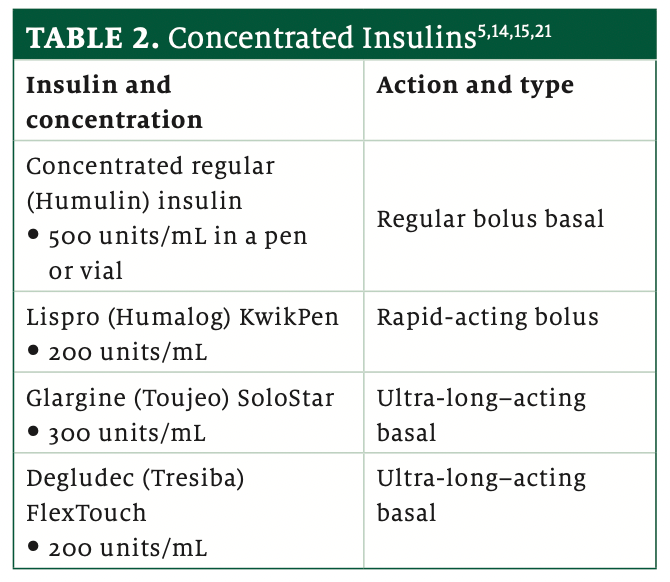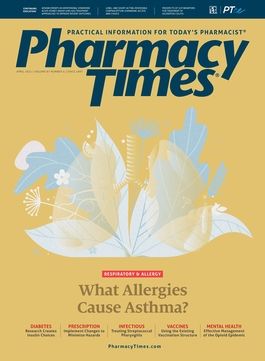Publication
Article
Pharmacy Times
Research Has Created Excellent Insulin Choices
Author(s):
Pharmacists can sort through options to reduce confusion for patients and prescribers
In recent years, advancing insulin research has created new options for patients and mind-numbing confusion for some pharmacy staff members.
Practitioners must embrace insulin science because intermediate-acting insulin (NPH) is a high-risk medication. It is important to remember the basics, which can help sort the insulin types in many ways.
Just 2 Derivations
This sort is simple. Insulins can be analog or synthetic human insulin. Analog insulin is manufactured to be similar to human insulin but modification creates insulins that work more quickly or slowly.1
Synthetic human insulin’s structure is identical to endogenous insulin’s structure.1 Manufacturers insert the human insulin gene into bacteria or yeast, which then produces insulin.
Using extraction, purification, and unique delivery methods, scientists refine insulin’s onset of action and duration. The 3 types of human insulin are NPH, short-acting human insulin (regular insulin), and premixed combinations of intermediate- and short-acting insulin. Synthetic insulins have no long-acting version.1
Cost
Another way to sort is by cost. Newer than synthetic versions, analog insulin continues to be refined by research.2 Innovators often supply it in 1-use devices, such as pens, pumps, and vials, making it more expensive. Cost and insurance coverage often influence patients’ choices.2
Onset, Peak, and Duration
In this sort, onset of action dictates timing. Patients can inject rapid-acting insulins close to meals, rather than 30 to 60 minutes before, which makes them convenient and lowers hypoglycemia risk. Patients can administer some rapid-acting insulin after meals.2
Depending on the patient’s glucose elevation pattern, prescribers will refine their prescribing based on the insulin’s peak and duration of action. Longer-acting insulins are “basal,” and rapid and short-acting insulins are called “bolus.”1 Prescribers have 5 options:
- Rapid-acting insulin begins to work in 10 to 30 minutes, peaks in 1 or 2 hours, and lasts 3 to 5 hours. Aspart, glulisine, and lispro insulins fall into this category, as does inhaled insulin.3-6
- Regular or short-acting insulin has an onset of about 30 minutes, peaks at 2 to 3 hours, and has a duration of 5 to 8 hours.7,8
- Intermediate-acting insulin, or NPH insulin, starts to work after 2 to 4 hours, peaks 4 to 10 hours later, and lasts 10 to 16 hours.9,10
- Long-acting insulin (detemir and glargine U-100) takes 1 to 2 hours to work and will lower glucose levels for up to 24 hours or more.11-14
- Ultra-long-acting insulin takes 6 hours to start working, has no peak, and continues to work for 36 hours or longer. Two products fall into this category: degludec U-100 and U200 and glargine U-300.15

Purpose
Next, remember that clinicians use basal insulin to maintain glucose homeostasis in the fasting state and bolus insulin to cover meals.1
After a review of the basics, it is possible to build a table that sorts various insulin products. Table 13-20 summarizes the points developed above.

Concentration
As the population’s average body mass index has increased, so have insulin doses. For patients who need doses exceeding 100 units, concentrated insulins, those with concentrations exceeding the usual 100 units/mL, are helpful. Smaller volumes improve absorption. Also, newer ultra-long–acting insulins mimic endogenous basal insulin’s long duration of action. Table 25,14,15,21 lists available concentrated insulins. All newly approved concentrated insulins must have matching delivery devices so they are available only in pen devices. U-500 is still available in a vial and requires a dedicated U-500 syringe or a U-500 pen.21
Conclusion
Sorting through insulins can benefit pharmacists in helping patients and prescribers find the best balance of basal, bolus, convenience, and cost.
Jeanette Y. Wick, MBA, RPh, FASCP, is the assistant director of the Office of Pharmacy Professional Development at the University of Connecticut School of Pharmacy in Storrs.
REFERENCES
- Lapolla A, Dalfrà MG. Hundred years of insulin therapy: purified early insulins. Am J Ther. 2020;27(1):e24-e29. doi:10.1097/MJT.0000000000001081
- Cernea S, Raz I. Insulin therapy: future perspectives. Am J Ther. 2020;27(1):e121-e132. doi:10.1097/MJT.0000000000001076
- NovoLog. Prescribing information.Novo Nordisk Inc;2012. Accessed March 18, 2021. https://www.accessdata.fda.gov/drugsatfda_docs/label/2015/020986s082lbl.pdf
- Apidra. Prescribing information. Sanofi;2008. Accessed March 18, 2021. https://www.accessdata.fda.gov/drugsatfda_docs/label/2008/021629s015lbl.pdf
- Humalog.Prescribing information. Lilly USA,LLC; 2007. Accessed March 19, 2021. https://www.accessdata.fda.gov/drugsatfda_docs/label/2013/020563s115lbl.pdf
- Afrezza.Prescribing information. MannKind Corporation;2014. Accessed March 19, 2021. https://www.accessdata.fda.gov/drugsatfda_docs/label/2014/022472lbl.pdf
- Humulin R.Prescribing information. Lilly USA,LLC;2011.Accessed March 21, 2021. https://www.accessdata.fda.gov/drugsatfda_docs/label/2011/018780s120lbl.pdf
- Novolin R.Prescribing information. Novo Nordisk Inc;2012. Accessed March 21, 2021. https://www.accessdata.fda.gov/drugsatfda_docs/label/2012/019938s066lbl.pdf
- Humulin N. Prescribing information. Lilly USA,LLC;1992. Accessed March 19, 2021. https://www.accessdata.fda.gov/drugsatfda_docs/label/2018/018781s181lbl.pdf
- Novolin N.Prescribing information. Novo Nordisk Inc;2019. Accessed March 19, 2021. https://www.accessdata.fda.gov/drugsatfda_docs/label/2019/019959s082lbl.pdf
- Levemir.Prescribing information. Novo Nordisk Inc;2012. Accessed March 19, 2021. https://www.accessdata.fda.gov/drugsatfda_docs/label/2012/021536s037lbl.pdf
- Lantus.Prescribing information. Sanofi; 2018. Accessed March 19, 2021. https://www.accessdata.fda.gov/drugsatfda_docs/label/2019/021081s072lbl.pdf
- Basaglar.Prescribing information. Lilly USA, LLC;2015.Accessed March 19, 2021. https://www.accessdata.fda.gov/drugsatfda_docs/label/2015/205692lbl.pdf
- Tresiba.Prescribing information. Novo Nordisk Inc;2015. Accessed March 19, 2021. https://www.accessdata.fda.gov/drugsatfda_docs/label/2015/203314lbl.pdf
- ToujeoU-300.Prescribing information. Sanofi;2015.Accessed March 19, 2021. https://www.accessdata.fda.gov/drugsatfda_docs/label/2015/206538lbl.pdf
- Humulin 70/30.Prescribing information.Lilly USA,LLC;1992. Accessed March 19, 2021. https://www.accessdata.fda.gov/drugsatfda_docs/label/2018/019717s161lbl.pdf
- Novolin 70/30. Prescribing information. Novo Nordisk Inc;2005. Accessed March 19, 2021. https://www.accessdata.fda.gov/drugsatfda_docs/label/2016/019991s077lbl.pdf
- Humalog Mix50/50.Prescribing information. Lilly USA, LLC;2019.Accessed March 19, 2021. https://www.accessdata.fda.gov/drugsatfda_docs/label/2015/021018s100lbl.pdf
- Humalog Mix75/25.Prescribing information. Lilly USA, LLC;2012. Accessed March 19, 2021.https://www.accessdata.fda.gov/drugsatfda_docs/label/2013/021017s072lbl.pdf
- NovoLog Mix 70/30.Prescribing information. Novo Nordisk Inc;2007. Accessed March 21, 2021. https://www.accessdata.fda.gov/drugsatfda_docs/label/2007/021172s034lbl.pdf
- Humulin R U-500.Prescribing information. Lilly USA, LLC;2016.Accessed March 21, 2021. https://www.accessdata.fda.gov/drugsatfda_docs/label/2016/018780s153lbl.pdf

Newsletter
Stay informed on drug updates, treatment guidelines, and pharmacy practice trends—subscribe to Pharmacy Times for weekly clinical insights.





